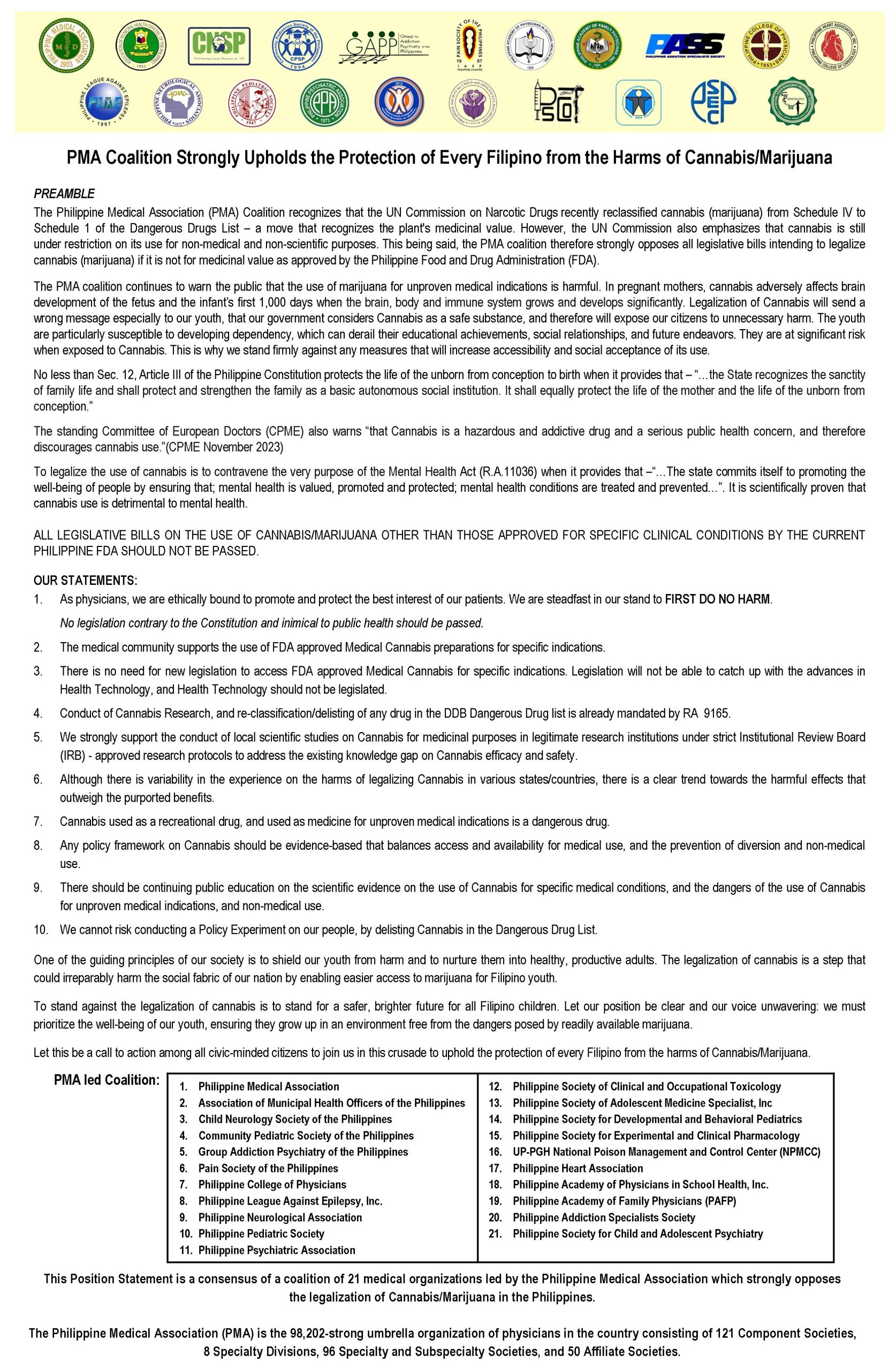THE USE of marijuana for recreational and non-proven medical purposes “could irreparably harm the social fabric of our nation,” a coalition of medical groups led by the Philippine Medical Association (PMA) asserted in a statement on Tuesday, Feb. 6.
In warning against laxer restrictions on marijuana, the coalition is opposed to any bills intended to legalize the drug.
“All legislative bills on the use of cannabis/marijuana other than those approved for specific clinical conditions by the current Philippine FDA (Food and Drug Administration) should not be passed,” the coalition said.
“Legalization of cannabis will send a wrong message to our youth: That our government considers cannabis as a safe substance, and therefore will expose our citizens to unnecessary harm.”

The prospects of legalizing marijuana for medical use have intensified as legislators endorsed the potential of the drug to treat serious diseases, which include Alzheimer’s disease, epilepsy, HIV/AIDS, and multiple sclerosis, according to the American healthcare company Mayo Clinic.
In the current 19th Congress, 10 bills were filed in the House and one in the Senate to provide the right of access to cannabis, exclude it from the list of dangerous drugs, and establish an organization responsible for research development.
The Department of Health (DOH) has supported calls for medical marijuana legalization, citing the tediousness of obtaining a compassionate use permit from the FDA.
“We are in favor of the legalization of medical marijuana and its products,” DOH Secretary Teodoro Herbosa told the Commission of Appointments during his confirmation hearing in September 2023. “There is a compassionate use permit given by the FDA, pero ito po ay napakahirap, kasi ire-request pa ng isang doctor sa FDA ‘yong paperwork bago ma-import ‘yong cannabis.”
The PMA-led coalition, however, believes that legislation to access FDA-approved medical cannabis is already unnecessary.
“Legislation will not be able to catch up with the advances in health technology, and health technology should not be legislated,” the statement read.
The coalition asserted that any policy on cannabis must be grounded on an “evidence-based framework” that would not jeopardize the well-being of the people.
“We cannot risk conducting a policy experiment on our people by delisting cannabis from the dangerous drug list,” it said.
More than 60 percent of Filipinos back bills to permit medical cannabis as long as proponents “conduct more research and strict policy guidelines for access and dosage control,” according to an Aug. 1 to 10 survey by the independent think tank Capstone-Intel Corp.
Prominent figures have admitted to using the drug outside the Philippines. For instance, former president Gloria Macapagal-Arroyo, in 2019, said she used a cannabis patch to ease the pain caused by having multiple cervical spondylosis, which affects the spinal disks of the neck.
The coalition warned that marijuana could cause birth defects in babies if pregnant mothers use it and be the culprit for mental health issues and drug dependency among the youth.

The PMA – whose president is Dr. Maria Minerva Calimag, an anesthesiologist and professor at the UST Faculty of Medicine and Surgery – led the publication of the position statement together with 20 other medical organizations, including the Philippine College of Physicians, Philippine Pediatric Society, Philippine Psychiatric Association and the Philippine Heart Association. Liam Sebastian C. Sanchez














